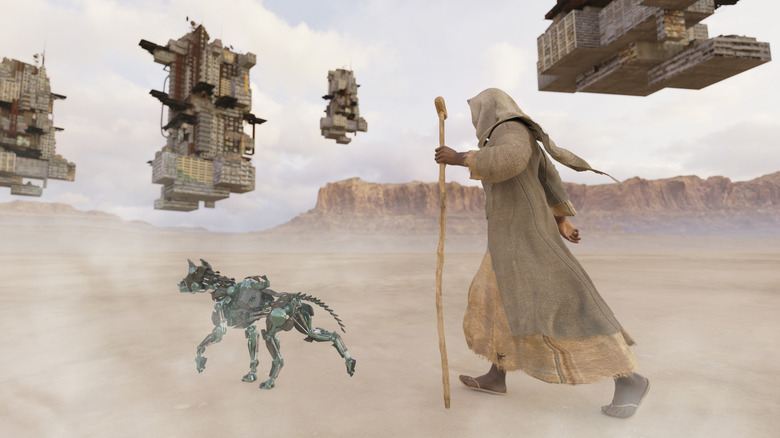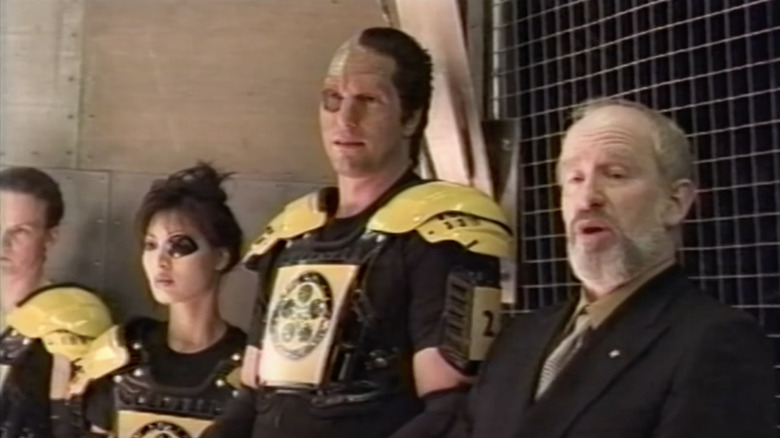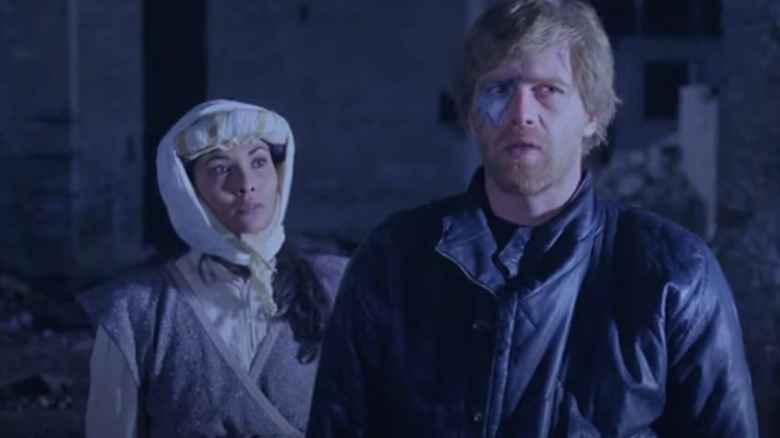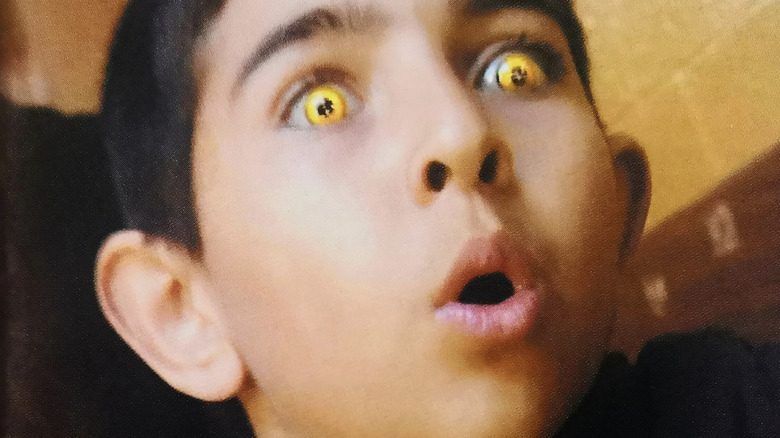What Vintage Sci-Fi Imagined 2025 Would Look Like
Across the 1,800-year-old history of science fiction, authors and creators were fixated on the year 2000. From real inventions inspired by science fiction to movies accurately predicting the future, the science fiction of the past has had a surprisingly good track record of prognosticating what life would look like in the 2000s. But let's face it: because the 21st century was built up so much in the collective imagination, and because what were once technological marvels are now commonplace or even mundane, it truly feels like our present day is also the future.
With the 2000s a quarter of the way over with, it's a good time to reflect on what the future, or present, became, judging it against what works of sci-fi thought it would be like. A lot of older movies, TV shows, and books from even the late 20th century had a lot of startling and frightening predictions for life in 2025. In short, a totalitarian dystopia filled with evil reality shows and humanity trying to move on from war, apocalypse, or environmental disaster seemed to await us. Here's what some old-school science fiction thought life would be like in the future — but now contemporary year — of 2025.
Sports and games are televised and deadly
The most popular sport of the future is the roller derby-inspired Futuresport, at least in the far-off year of 2025, in the 1998 made-for-TV movie "Futuresport." The violent, dazzling, and heavily televised game, created by Obike Fixx (Wesley Snipes) and Tre "The Pharaoh" Ramzey (Dean Cain) as a means to resolve disputes between street gangs, involves competitors racing around a track, fighting for an electrified ball on inline skates, and flying with the aid of hoverboards.
By 2025, Futuresport has been co-opted as a replacement for war, with the handful of remaining global political entities fielding Futuresport teams whose matches determine what tracts of land go to whom. That unsettling status quo is threatened when the North American Alliance and the Pan-Pacific Commonwealth contingents wage a sport-war with the terrorist Hawaiian Liberation Organization for control of Hawaii.
In another example of how sci-fi imagined people today being bloodthirsty sports fans, in 1982, Stephen King, under the pen name of Richard Bachman, published "The Running Man," set in 2025 and later adapted into a 2010s-placed film. With global violence at a high and the U.S. economy at an all-time low, Americans distract themselves with "The Running Man," a game show that awards increasing cash prizes to contestants the longer they can survive teams of contract killers.
Crime is bad, the punishment is worse
Only a few decades ago, it appeared as if urban-based crime was going to get a lot worse by the early 21st century. The 2010 movie "Zebraman 2: Attack on Zebra City" is set in the year 2025, an era in which all crime is legal in Tokyo — provided that citizens follow certain guidelines. After the wicked Kozou Aihara (Guadalcanal Taca) is elected governor of Tokyo, he rebrands the metropolis "Zebra City" and then institutes something called "Zebra Time," a five-minute period starting at 5 a.m. and again at 5 p.m., in which the people are encouraged to do all the horrible, unethical, and illegal things that they think they can get away with. That's because during Zebra Time, Zebra City Police can do whatever they wish, too, meaning they can attack and kill anyone caught in what would otherwise be considered an illegal act.
Somehow, Zebra Time has proven so effective at keeping everyone in line that plans get underway to institute Zebra Time all over the world. Now that we're in 2025, we can safely say that didn't happen. If the efforts of self-proclaimed superheroes Zebraman (Shô Aikawa) and the Zebra Queen (Riisa Naka) worked out, it would have ended in the city formerly known as Tokyo, by now, too.
Life is rough in post-nuclear New York
For those who are obsessed with the Roman Empire, the 2025 foretold by the 1983 movie "Endgame – Bronx Lotta Finale" ("Endgame – Bronx Final Fight"), there's good news in store: gladiator fighting was supposed to make a big comeback after 2,000 years or so out of the spotlight. And all it took was a massive nuclear war, and the subsequent fallout of World War III that left New York City a radiation-soaked nightmare land.
The Big Apple remains heavily populated in this dark alternate timeline, however, full of newfound dangers such as criminal motorcycle gangs, psychics who can read minds, hordes of scavengers just looking for what they need to survive, and a militarized New York Police Department. A cabal of ultra-rich figures lords over New York, and they keep all the regular people calm and distracted from the horrific things around them with "Endgame," a reality show that makes its essentially enslaved contestants fight to the death in a series of gladiatorial challenges in order to win fabulous prizes. One TV gladiator named Ron Shannon (Al Cliver) throws the whole system into doubt when he breaks away from his "Endgame" handlers to help a group of psychic mutants escape New York.
The world is underwater and populated by telekinetic kids
The creators of the short-lived 2000 dark sci-fi kids' show "Life Force" assumed that climate change would be a pretty big problem by 2025, going so far as to depict the world of that year mostly underwater due to the destruction of the polar ice caps. All that's left of the United Kingdom is a few small, barely habitable islands.
Matching the geographic trouble are political and social issues brought on by a fascist government agency called The Commission that tries to keep climate refugees out of the country and aims to exploit the new subset of genetically modified super-humans with psychic abilities who can move stuff and cause great destruction with their minds. The story is told from the point of view of two such glowing-eyed "Senders," siblings Karen (Julia Haworth) and Greg Webber (Paul Fox), living alone on an island that used to be a mountain range because their parents were imprisoned for teaching science.
Time travel and huge prisons are a part of life
The 1994 Jean-Claude Van Damme blockbuster "Timecop" established a futuristic world in which time travel is available and in regular use by 2004, although it's heavily policed by a Time Enforcement Commission. The 2003 straight-to-video sequel, "Timecop 2: The Berlin Decision," concerns the actions of Brandon Miller (Thomas Ian Griffith), the rogue leader of the history-preserving Society for Historical Authenticity, and his drive to use the now perfected tools of time travel to head back to 1940 and kill Adolf Hitler.
Timecop, or rather TEC Agent Ryan Chang (Jason Scott Lee), chases Miller through various versions of history and alternate takes on this already alternate 2025. For example, Miller plays with the past to free himself from a World Penitentiary, there's a deadly and significant war at some point, time travel is taught at the University of Southern California, and for a little while, Hitler never became a notorious and murderous dictator.





